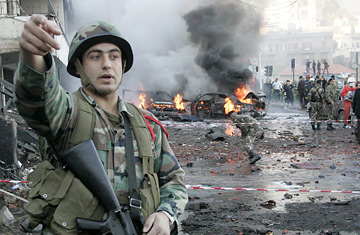
Lebanese soldiers secure the site of an explosion in the Christian town of Baabda, east of Beirut.
A top general in the Lebanese army was killed early Wednesday when a powerful car bomb exploded beside his vehicle in a residential suburb of Beirut.
General Francois Hajj, the chief of operations in the Lebanese army, died instantly along with at least four other soldiers. The blast from the 77-pound bomb packed inside a BMW hurled Hajj's body more than 100 yards from his car and damaged nearby buildings in the upscale Baabda district close to the presidential palace.
Hajj's murder came two days after a parliamentary session to elect a new President was postponed for the eighth time, and is certain to aggravate tensions between rival pro- and anti-Syrian factions. The bombing, said Information Minister Ghazi Aridi, "is a message to the Lebanese that the situation in Lebanon will remain fragile and that security will remain a target."
Lebanon has been without a President since November 23, when Emile Lahoud stepped down. General Michel Suleiman, the commander of the Lebanese army, has been selected as a consensus candidate agreeable to the anti-Syrian March 14 parliamentary majority as well as the pro-Syrian opposition. But his election has become mired in squabbles over the process of amending the constitution to allow Suleiman to move directly into the presidential palace, forgoing the customary two-year cooling-off period for senior civil servants. The election has been rescheduled for December 17, although analysts suspect that the presidential vacuum could continue until at least into the New Year.
Hajj's murder is certain to stir further calls by the March 14 bloc to directly elect Suleiman by a simple parliamentary majority to avoid a prolonged void. The opposition has warned that such a move would be countered by street demonstrations and possibly the establishment of a rival government.
This latest Lebanese assassination may have ramifications further afield, given the heightened speculation of a thaw in relations between the U.S. and Syria since Damascus participated in the Annapolis peace summit two weeks ago. An international coalition headed by the U.S. and France is heavily engaged in mediating an agreement over the presidency. France has been particularly active, with Foreign Minister Bernard Kouchner spending much of the past three weeks in Beirut shuttling between bickering Lebanese politicians while other French officials have consulted the Syrian leadership. In reaction to the bomb attack, a clearly exasperated Kouchner said it was a "cowardly attack that shows a clear intention to cause instability," adding that the correct response is to proceed with the presidential election.
Hajj was considered a leading candidate to take over as army commander from Suleiman if he is elected President. The killing of a senior officer in the widely revered Lebanese army has stunned a country that has grown bitterly accustomed to assassinations and bombings over the past four years. He is the ninth prominent Lebanese to have been killed since February 2005, when Rafik Hariri, a former Prime Minister, died in a truck bomb explosion. A United Nations investigation into the Hariri murder suggested that Syrian officials were involved.
Still, attacks against members of the Lebanese security services are rare. The only other security official targeted in the past three years was a police colonel involved in the Hariri murder investigation who survived a roadside bomb attack in September 2005. "All Lebanese agree that the army must be kept united as it is seen as the only institution that is keeping the country together," said Timur Goksel, a Mideast security consultant in Beirut and former U.N. official in south Lebanon.
The Lebanese army earned nationwide praise for its role in the three-month battle this summer with Fatah al-Islam, an Al-Qaeda-inspired faction that was based in the Nahr al-Bared Palestinian refugee camp in north Lebanon. As head of military operations, Hajj played a prominent role in the confrontation as well as organizing the deployment of Lebanese troops along the border with Syria through which militants and weapons are alleged to have been smuggled into Lebanon. "General Hajj played a big role in anti-terror operations and his murder could be revenge by the terrorists," a senior Lebanese army general told TIME.
Anti-Syrian politicians, however, were quick to blame Damascus, accusing the Syrian regime of seeking to cause instability in Lebanon. "I point an accusing finger directly at the Syrian regime as the scheme has been carried out since three years until today with no one to deter this regime," said Antoine Andraous, a member of the March 14 bloc.
Syria denounced the assassination with the official SANA news agency quoting an unidentified official as saying that Israel and "its tools in Lebanon" were responsible for Hajj's murder.
It seems that bridging the impasse between the rival Lebanese factions looks further away than ever.
